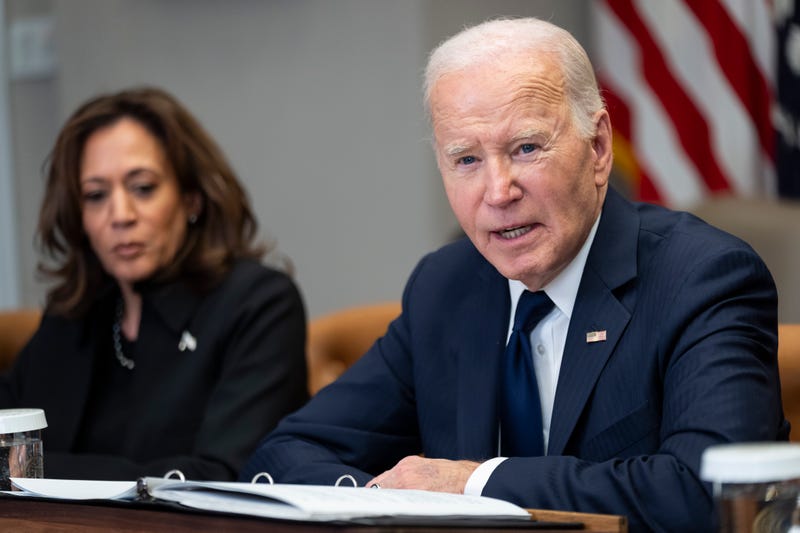
MIAMI (AP) — About 600,000 Venezuelans and more than 230,000 Salvadorans already living in the United States can legally remain another 18 months, the Department of Homeland Security said Friday, barely a week before President-elect Donald Trump takes office with promises of hardline immigration policies.
Biden's administration has strongly supported Temporary Protected Status, which he has broadly expanded to cover about 1 million people. TPS faces an uncertain future under Trump, who tried to sharply curtail its use during his first term as president. Federal regulations would allow the extensions to be terminated early, although that's never been done before. Homeland Security also extended TPS for more than 103,000 Ukrainians and 1,900 Sudanese who are already living in the U.S.
“When I received the news today, it was really good news for all people, all the Venezuelan immigrants, especially in Philadelphia,” said Marcos Bolivar, who leads Casa de Venezuela in Philadelphia, one of the longest-running cultural and support organizations in the city for Venezuelan immigrants and Venezuelan-Americans.
Bolivar has seen the community grow in the area — now close to 5,000 according to the census — since the Biden administration first offered TPS status to Venezuelans in 2021.
The TPS designation gives people legal authority to be in the country but doesn't provide them a long-term path to citizenship. They are reliant on the government renewing their status when it expires. Conservative critics have said that over time, the renewal of the protection status becomes automatic, regardless of what is happening in the person's home country.
Friday's announcement, which came as Venezuelan President Nicolás Maduro took office for a third six-year term in Caracas amid widespread international condemnation, is "based on the severe humanitarian emergency the country continues to face due to political and economic crises under the Maduro regime," the department said.
Emilio Buitrago, a leader in Philadelphia’s Venezuelan community for more than 20 years, says Friday’s extension couldn’t have come at a better time.
“It just felt perfect within the circumstances happening today in Venezuela, when Nicolás Maduro decided to officially take over and become a dictator.”
Homeland Security cited "environmental conditions in El Salvador that prevent individuals from returning," specifically heavy rains and storms in the last two years.
Congress created TPS in 1990 to prevent deportations to countries suffering from natural disasters or civil strife, giving people authorization to work in increments of up to 18 months at a time.
About 1 million immigrants from 17 countries are protected by TPS, including people from Venezuela, Haiti, Honduras, Nicaragua, Afghanistan, Sudan, Ukraine and Lebanon. Venezuelans are one of the largest beneficiaries and their extension runs from April 2025 to Oct. 2, 2026.
Salvadorans won TPS in 2001 after earthquakes rocked the Central American country. TPS for Salvadorans was to expire in March and was extended until Sept. 9, 2026.
Trump and his running mate, JD Vance, suggested they would scale back the use of TPS and policies granting temporary status as they pursue mass deportations. During his first administration, Trump ended TPS for El Salvador but was held up in court.
“We think that he’s gonna try to do the same, but we know that there’s an army of pro-immigrant organizations ready to fight that in the court,” Buitrago said. “It’s not gonna be easy, we hope that it’s not gonna be easy, and that TPS will remain.”
In recent months, advocates have increased pressure on the Biden administration to ask for TPS extensions for those who already have it and to protect people from other countries like Guatemala and Ecuador.
"This extension is just a small victory," said Felipe Arnoldo Díaz, an activist with the National TPS Alliance. "Our biggest concern is that after El Salvador, there are countries whose TPS are expiring soon and are being left out" like Nepal, Nicaragua, and Honduras.
Victor Macedo, a 40-year-old Venezuelan, arrived to the U.S. in 2021 after receiving death threats back home for being an activist with the political opposition. He couldn't believe the news about the extension, as his TPS was set to expire in April.
"It is a very big relief. I was afraid," said Macedo, who works remodeling houses in Davie, Florida. "TPS helps me have legal status, work, and be able to drive."
